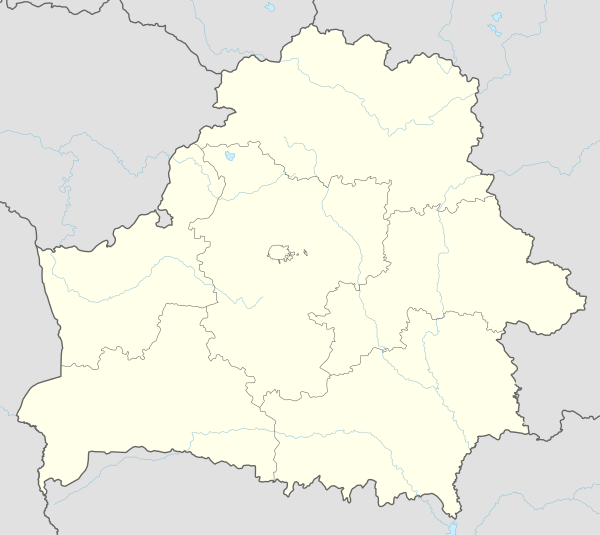Lyuban, Belarus
Lyuban Belarusian: Любань, romanized: Liubań - Russian: Лю́бань, Polish: Lubań, Lithuanian: Liubanė), or Ljubań, is a town in Belarus, located in the Minsk Region. It is the administrative seat of the Lyuban District. As of 2009 its population was of 11,256.[1]
Lyuban Любань | |
|---|---|
Town | |
 Flag  Coat of arms | |
 Lyuban Любань Location of Lyuban | |
| Coordinates: 52°47′55″N 27°59′30″E | |
| Country Voblast Raion | Lyuban District |
| Founded | 1566 |
| Population (2009) | |
| • Total | 11,256 |
| Time zone | UTC+2 (EET) |
| • Summer (DST) | UTC+3 (EEST) |
| License plate | 5 |
| Website | Official website |
History
The town was first mentioned in 1566 and received its town (Город, Gorod) status in 1968. Nazis occupied the town from July 1941 to June 1944. On August, 1941, 150 to 200 Jews of the village are murdered in a mass execution perpetrated by Germans at a gravel pit near the village of Dubniki.[2] In September 1941, a ghetto surrounded with barbed wire was created in the west part of the village of Lyuban, near Pervomayiskayia Street. It was guarded by Germans and local policemen. Jews were used as forced, cleaning or repairing roads. On November 8, 1941, 50 Jewish men were shot, as a reprisal action after a partisan attack. On December 4, 1941, the ghetto was liquidated and Jews were murdered.[3].
Geography
Lyuban is located 139 km in south of Minsk, not too far from the borders with the Voblasts of Mogilev and Gomel. It is 58 km far from Salihorsk, 30 from Slutsk and 26 from Staryya Darohi. In north of the town is located the Lyuban Lake and in west, close to Salihorsk suburbs, the mining area of Kaliy. It is not served by railways but the nearest station, in Ureche, is 8 km far from Lyuban center.
References
- (in Russian) 2009 statistics of Belarus Archived 2010-10-30 at the Wayback Machine (Belstat)
- Yad Vashem, killing sites, Minsk region.
- "YAHAD - IN UNUM". yahadmap.org. Retrieved 2017-07-15.
External links
![]()
- (in Russian) Lyuban official website
Kirovsky Marketplace (Lyuban) official website
